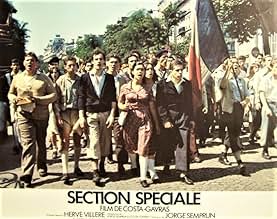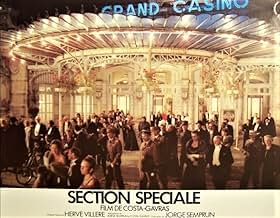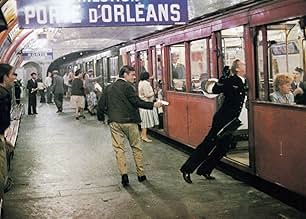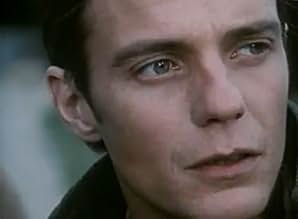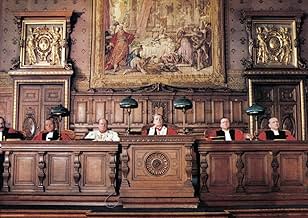Section spéciale
- 1975
- Tous publics
- 1h 58m
IMDb RATING
7.6/10
1.8K
YOUR RATING
In occupied France during World War II a German officer is murdered. The collaborationist Vichy government decides to pin the murder on six petty criminals. Loyal judges are called in to con... Read allIn occupied France during World War II a German officer is murdered. The collaborationist Vichy government decides to pin the murder on six petty criminals. Loyal judges are called in to convict them as quickly as possible.In occupied France during World War II a German officer is murdered. The collaborationist Vichy government decides to pin the murder on six petty criminals. Loyal judges are called in to convict them as quickly as possible.
- Director
- Writers
- Stars
- Awards
- 2 wins & 2 nominations total
Michael Lonsdale
- Pierre Pucheu, le ministre de l'Intérieur
- (as Michel Lonsdale)
- Director
- Writers
- All cast & crew
- Production, box office & more at IMDbPro
Featured reviews
After the film of Max OPHULS "le chagrin et la pitié" this picture shows the obedience of 99% of the judjes in France during the german occupation. Of course all the jews or any reluctant were killed. It's a shame for my country. As said Otto ABETZ, chief of the Gestapo in France, "the french used to make too much"! For us it's not a congratulation. The actal Président Jacques CHIRAC took heart to empasize this on 1995.
Costa-Gavras was an activist director concerning political cinema, this turn the target is the infamous Section Speciale hastily assembled in occupied France on WWII by Nazi forces since 1940, such military occupation certainly will trigger the patriotic sense on the French soon or later, in response at first attempt against a German Officer they offer to Germans a quick solution, engendering a Section Speciale grounded in a retroactive law enforced overnight.
As expect many magistrates turn down the crying shame ruling, then they have carefully pick up the greediest judges for the power passing over legal principles aiming for earnings by promotion on high-ranking of French justice, worst they have to overturn the district attorney's office and all lawyers as well to condemn to death everyone less fortunate by a light offence.
Thanks for reading.
Resume:
First watch: 2024 / How many: 1 / Source: DVD / Rating: 8.
As expect many magistrates turn down the crying shame ruling, then they have carefully pick up the greediest judges for the power passing over legal principles aiming for earnings by promotion on high-ranking of French justice, worst they have to overturn the district attorney's office and all lawyers as well to condemn to death everyone less fortunate by a light offence.
Thanks for reading.
Resume:
First watch: 2024 / How many: 1 / Source: DVD / Rating: 8.
Unlike "Z" and "L'Aveu" ,"Section Speciale" was not a big success when it was theatrically released ."Z" took place in Greece and "L"Aveu" behind the iron curtain."Section Spéciale" takes place in France and it is no easy to clean your own backyard .Coming after "Le Chagrin Et La Pitié" and "Lacombe Lucien" which both showed the other side of the French attitude towards their occupying forces (till the seventies,most of the movies dealt with the French resistance from "Le Père Tranquille" to "L'Armée Des Ombres" ),Costa-Gavras showed how the French used the law to commit injustice .And these French who sentenced their compatriots to death were not troubled after the Liberation (whereas others who did not kill anybody were).Main objection:"if we had not sacrificed these ones,a hundred of French people would have been shot..."
Although Costa-Gavras made his movie accessible to everyone (story telling has always been his forte,even in his American career),he did not try to sweeten the screenplay with love affairs or melodrama (the past of one of the victims,played by Yves Robert ,is almost treated with nonchalance and casualness).Although there is no superstar here (nobody like Yves Montand) most of the actors,even in small parts,were widely known by the French audience of the seventies: his producer,Jacques Perrin,had been the rebellious journalist in "Z" and he portrays the only lawyer who really "plays".
But Costa-Gavras's best idea for the casting is the choice of Claude Pieplu as the presiding judge: his high-pitched voice -it's necessary to see the movie in French with subtitles- works wonders,so to speak,and I can't see no other French actor in this part.This man was so talented he would convince you that all he did was for the sake of his homeland.
Although Costa-Gavras made his movie accessible to everyone (story telling has always been his forte,even in his American career),he did not try to sweeten the screenplay with love affairs or melodrama (the past of one of the victims,played by Yves Robert ,is almost treated with nonchalance and casualness).Although there is no superstar here (nobody like Yves Montand) most of the actors,even in small parts,were widely known by the French audience of the seventies: his producer,Jacques Perrin,had been the rebellious journalist in "Z" and he portrays the only lawyer who really "plays".
But Costa-Gavras's best idea for the casting is the choice of Claude Pieplu as the presiding judge: his high-pitched voice -it's necessary to see the movie in French with subtitles- works wonders,so to speak,and I can't see no other French actor in this part.This man was so talented he would convince you that all he did was for the sake of his homeland.
Although perhaps not quite on the same level as director Costa-Gavras' other scathing critiques of the abuse of power, this still has a great deal to recommend it in terms of its superlative adaptation from the novel of Hervé Villeré by Jorge Semprún and a cast comprising some of France's most distinguished actors. It lacks of course the 'star' attraction of Yves Montand and if you blink you will miss his uncredited appearance as a soup-eating militiaman. The overall pacing is measured but Gavras' regular editor Francois Bonnet maintains the momentum whilst the excellent score is by Eric de Marsan whose music had contributed so much to Melville's earlier 'L'Armée des Ombres'.
During the trial of Marechal Philippe Pétain the prosecutor referred to the 'Exceptional Courts' as 'a monstrous institution', a description which no decent human being would dispute. Following the shooting of a German midshipman in the Barbes-Rochechouart Métro by a Communist activist who would later achieve renown as Colonel Fabien, the Nazis had threatened to execute an hundred French hostages, regardless of rank or celebrity. Ostensibly to save French lives and appease his German masters, Pétain instigated the 'section spéciale' to pass sentence of death on a handful of token prisoners classed as 'undesirables' who had previously been given lighter sentences for minor crimes. It only remained to appoint the judges whose major qualifications were ambition, amorality, cowardice or a combination thereof.
This utterly grotesque situation lends itself to the blackest of humour and Gavras does not fall short in this regard, not least in the executioners hanging around the court impatiently awaiting the names of those they are to guillotine. What is most effective however is how the legislative charade and parody of justice are carried out with the most proper ceremony. As Michel Benon, president of the Special Court, Claude Piéplu again excels as the man you love to hate.
Although the film ends by informing us that none of the judges faced sanctions for their activities in fact the Minister of Justice at the time, Joseph Barthélemy, superbly played by veteran Louis Séigner, was tried by the High Court but died of cancer before the end of legal proceedings. The egregious Minister of the Interior, Pierre Pucheu, a chilling portrayal here by Michel Lonsdale, was destined, ironically, to be sentenced by a Special Court and executed by firing squad.
There is some justice after all.
During the trial of Marechal Philippe Pétain the prosecutor referred to the 'Exceptional Courts' as 'a monstrous institution', a description which no decent human being would dispute. Following the shooting of a German midshipman in the Barbes-Rochechouart Métro by a Communist activist who would later achieve renown as Colonel Fabien, the Nazis had threatened to execute an hundred French hostages, regardless of rank or celebrity. Ostensibly to save French lives and appease his German masters, Pétain instigated the 'section spéciale' to pass sentence of death on a handful of token prisoners classed as 'undesirables' who had previously been given lighter sentences for minor crimes. It only remained to appoint the judges whose major qualifications were ambition, amorality, cowardice or a combination thereof.
This utterly grotesque situation lends itself to the blackest of humour and Gavras does not fall short in this regard, not least in the executioners hanging around the court impatiently awaiting the names of those they are to guillotine. What is most effective however is how the legislative charade and parody of justice are carried out with the most proper ceremony. As Michel Benon, president of the Special Court, Claude Piéplu again excels as the man you love to hate.
Although the film ends by informing us that none of the judges faced sanctions for their activities in fact the Minister of Justice at the time, Joseph Barthélemy, superbly played by veteran Louis Séigner, was tried by the High Court but died of cancer before the end of legal proceedings. The egregious Minister of the Interior, Pierre Pucheu, a chilling portrayal here by Michel Lonsdale, was destined, ironically, to be sentenced by a Special Court and executed by firing squad.
There is some justice after all.
10LucasHC_
I say it is interesting because it shows how the law is not a science immune to abuse and ideologies, used to commit injustices.
After the advent of the French Revolution, and many subsequent events, legal science and contractual relations became the great tenets of modern society, but the powerful of this Earth always found a way to pervert things, and with the science of law it was not different.
From the point of view of legal principles it's painful, but what relieves conscience are the negatives of the great jurists, leaving only a few pessimists who thought that Nazi Germany would be the new world order after the Second War. They went bad, they got dirty in the story.
We must never give in to evil, even if it imposes itself as a new and "saving" order of the motherland.
After the advent of the French Revolution, and many subsequent events, legal science and contractual relations became the great tenets of modern society, but the powerful of this Earth always found a way to pervert things, and with the science of law it was not different.
From the point of view of legal principles it's painful, but what relieves conscience are the negatives of the great jurists, leaving only a few pessimists who thought that Nazi Germany would be the new world order after the Second War. They went bad, they got dirty in the story.
We must never give in to evil, even if it imposes itself as a new and "saving" order of the motherland.
Did you know
- TriviaAll the names of the accused are real. Abraham Trzebrucki, André Bréchet, Émile Bastard, Lucien Sampaix, etc.
- GoofsWhen two of the judges have lunch on a restaurant patio, two members of the French Milice, wearing the gamma insignia, are sitting at a table behind. The action is set in summer 1941 but the Milice, subordinated to the French government in Vichy was created in January 1943.
- ConnectionsReferenced in Brigade spéciale (1976)
- How long is Special Section?Powered by Alexa
Details
- Runtime1 hour 58 minutes
- Sound mix
- Aspect ratio
- 1.66 : 1
Contribute to this page
Suggest an edit or add missing content


